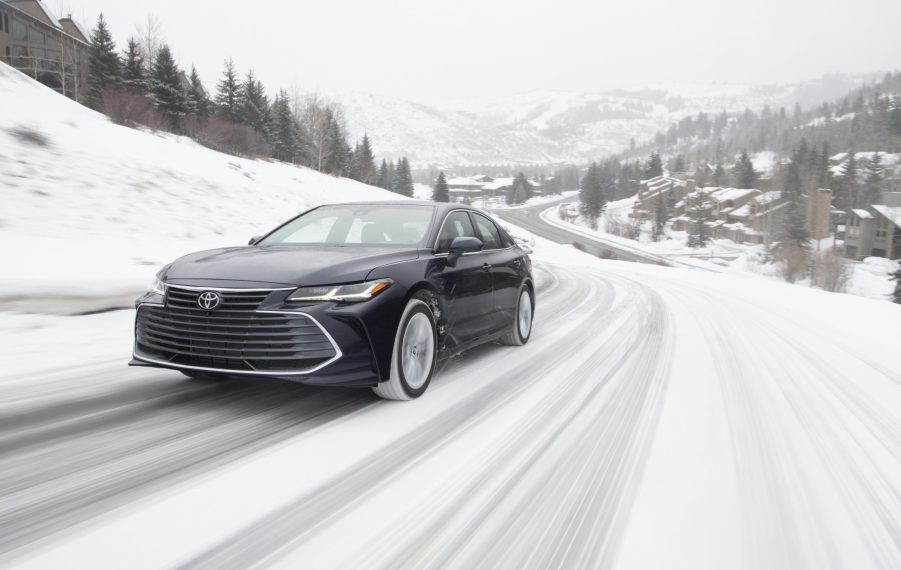
Is the New Toyota Avalon AWD Worth the Upcharge?
The Toyota Avalon is the brand’s flagship sedan, slotting just below Lexus’ lineup. It enjoys a reputation for reliability and safety, and it’s not uncommon for owners to hold onto their Avalons for close to a decade. However, even after introducing a TRD version, the Toyota Avalon still lacked something: all-wheel drive. But now, in addition to the AWD Camry, Toyota will also make an AWD Avalon.
Toyota Avalon AWD features

Although Toyota has offered AWD passenger cars before, this is the first time an Avalon has the option. However, only the XLE and Limited models can be equipped with it.

As with the Camry, the Toyota Avalon gets the RAV4’s AWD system, because all three vehicles ride on the same platform. This system includes the RAV4’s rear suspension and differential, transfer case, and 8-speed transmission.

Also, like the Camry, Toyota had to modify the Avalon’s floor to get the AWD system to fit, which required a new gas tank and the Highlander SUV’s propeller shaft. But Toyota claims the Avalon’s trunk and passenger space isn’t any smaller for it, although Autoblog reports the AWD sedan needed the 10-mm-higher Avalon Hybrid’s rear seat to clear the new tank.

However, the Toyota Avalon AWD does differ in one more big way compared to its FWD versions. Because its AWD system comes from the RAV4, the AWD Avalon also gets the RAV4’s 205-hp 2.5-liter four-cylinder. The XLE and Limited sedans normally come with a 301-hp 3.5-liter V6. But, although Toyota reports the AWD Camry weighs 165 lbs more than the FWD models, the Avalon AWD’s weight is “similar” to the V6 versions. No doubt, that’s mostly down to the lighter four-cylinder.
The Toyota Avalon AWD will debut as a 2021 model and is expected to hit dealerships sometime in fall 2020. And as of this writing, official EPA ratings have not been made available. However, they’ll likely not be too different than the V6 car’s 22 mpg city and 32 mpg highway.
How it drives
Although the Avalon’s AWD doesn’t include a torque-vectoring system, it can send up to 50% of the engine’s power to the rear wheels. Roadshow reports the Avalon’s longer wheelbase makes it more stable in the snow than the Camry. In addition, Automobile Magazine reports that, as the Avalon weighs less than 100 lbs more than the Camry XSE, the four-cylinder’s power should be sufficient for most drivers.
In fact, Autoblog reports that, due to the Avalon’s increased sound deadening, the larger sedan actually feels quicker than the smaller Camry. Drivers can’t hear the engine as much, which makes them think it isn’t straining. The sedan also rides more comfortably than many SUVs purchased for AWD, especially the body-on-frame ones.

Autoblog also points out that the Toyota Avalon AWD compares favorably to its rivals. With Buick dropping its sedan offerings, that really only leaves the Dodge Charger GT SXT, which isn’t as luxurious as the Avalon.
But that begs another question: considering the similarities between the Camry and Avalon AWD, which is the one to buy?
Toyota Avalon AWD vs. Camry
Motor Trend compared both the Toyota Avalon AWD and Camry AWD on price and features. The Avalon does offer some features the standard Camry doesn’t get, such as more acoustic-deadening glass, a larger touchscreen, and more passenger and trunk space. In addition, the Camry AWD only gets heated seats as part of the optional All-Weather package, but they’re standard on the Avalon.

But, most of the Avalon’s more-premium features are found on the more expensive Limited trim, not the XLE. For example, the Camry XLE gets real leather seats, whereas the Avalon XLE has SofTex pseudo-leather. Upgraded JBL audio and navigation is a $7000 option on the Avalon XLE, but only $1,810 on the Camry. And even the Avalon Limited can’t get the Driver Assistance package, which adds $2,375 to the Camry XLE’s price.

Although Toyota hasn’t revealed official Avalon AWD pricing yet, the XLE starts at $35,875; the Limited at $42,175. The Camry XLE, meanwhile, starts at $29,455; MT’s fully-loaded Camry XLE AWD would cost $36,095.

Interestingly, MT notes that, although the Avalon shares some parts with the larger, more-expensive Lexus ES, and is even built with the same wheelbase in the same plant, the ES isn’t getting AWD. It’s possible, then, that Toyota intended the AWD primarily as a Camry option, with the Avalon being more of an afterthought. The choice of engines also supports this somewhat: Autoblog reports only 6% of Camry buyers chose the sedan’s V6 option. Toyota could have made the AWD compatible with the Avalon’s V6, across more trim levels, but didn’t.

With that in mind, unless you really need a bit of extra room and refinement, the Toyota Avalon AWD doesn’t seem worth the premium over the Camry.
Follow more updates from MotorBiscuit on our Facebook page.


